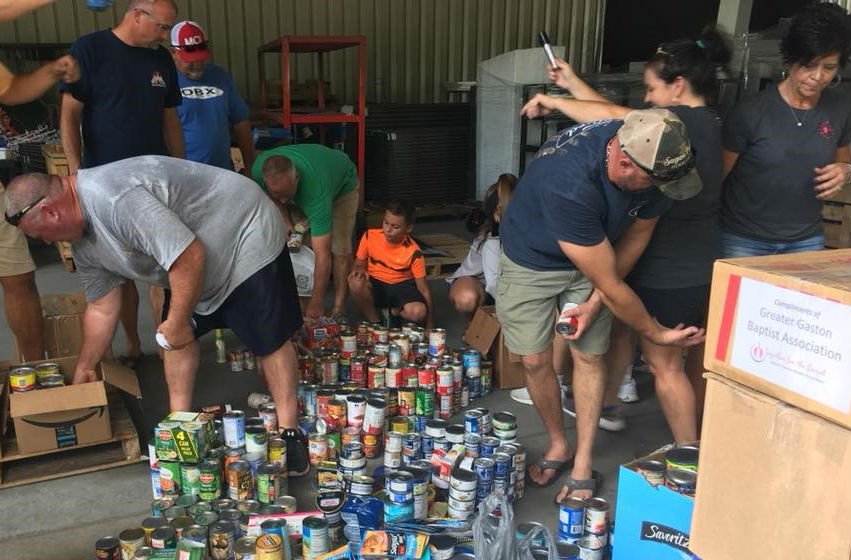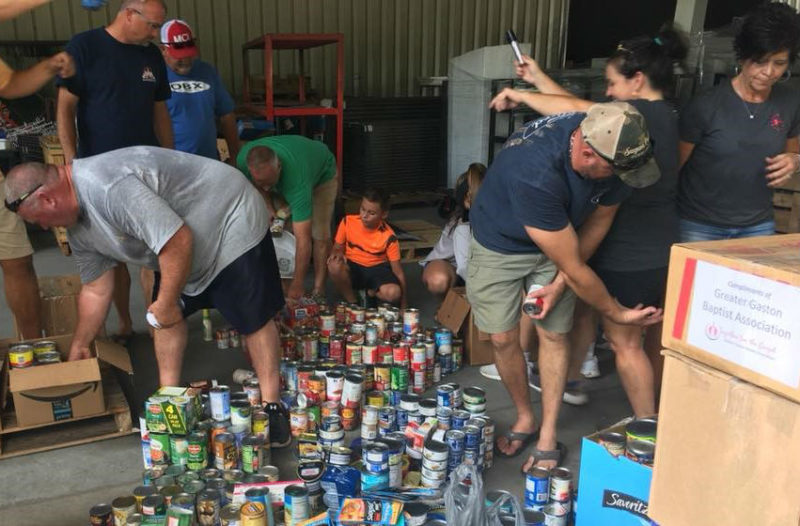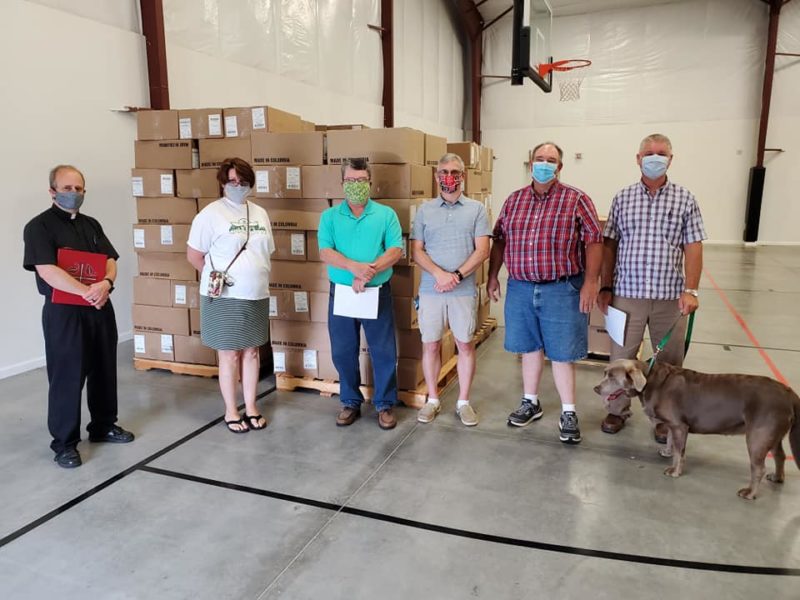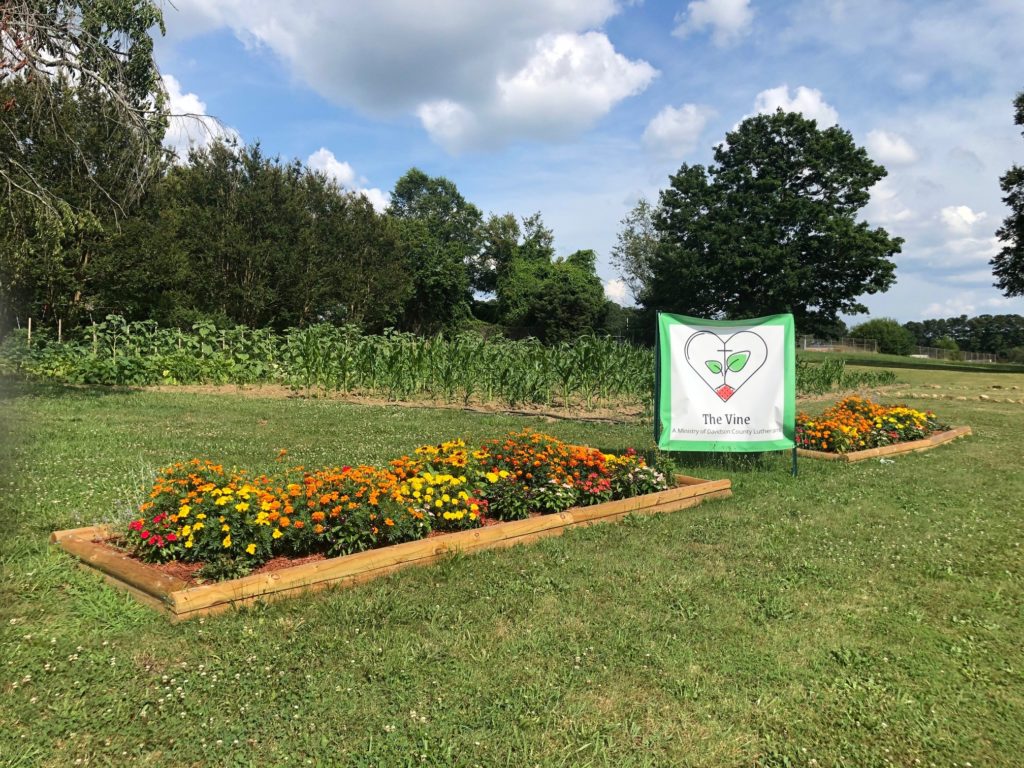Serving after the storm
Hurricane Florence hit the coast of North Carolina on September 14; Hurricane Michael arrived in NC on October 11. Congregations across the synod looked for meaningful ways to serve. The youth at Christ the King, Cary, shared love with St. Paul’s, Wilmington, by making bracelets and writing notes of prayers for St. Paul’s youth after hearing about Florence’s impact on the community of Wilmington.
Holy Communion, Banner Elk, sent a check to St. Matthew’s, Wilmington, to support their efforts to reach out to their neighbors or parishioners following the storm. Pastor David Mielke of Holy Communion said, “It is so easy just to send a check. We wish we weren’t so far from Wilmington that we could come and render assistance.”
Serving by listening
Since September 24, Pastor Michael Wendt (retired, Durham) has been working about eleven hours a day, seven days a week with only three days off. These days Wendt’s call finds him living in a hotel room and driving an hour to a Hurricane Relief Center where he spends his days listening to the stories of residents of eastern NC whose lives were forever changed by Hurricanes Florence and Michael (some of whom were still recovering from Hurricane Matthew in 2016).
Wendt serves as a reservist with the NC Department of Emergency Management to listen and network. Once a resident has met with representatives from FEMA, HUD, and other agencies, they meet with Wendt who listens and fills in the holes by connecting residents with state and local resources to meet some of their needs. For many who are recovering there is intense shock over what they’ve lost. That shock is followed by total bewilderment about where to start the recovery process, what resources are available, and how to access them. While Pastor Wendt’s current “day job” is as a state employee, his passion is helping faith communities network with those in need and think outside the box about how we do mission work.
On Sunday, November 11, Wendt attended St. Mark’s Lutheran Church in Lumberton for worship. Since Hurricane Matthew in 2016, St. Mark’s has been involved in hurricane recovery and community outreach. They have fed the hungry, distributed resources, provided winter coats, and much more.1
When Wendt arrived that morning, he was greeted by Rose Tencati and invited to lunch following worship. Rose has been a member for almost 20 years and currently serves with finance and property there. During the announcements, another member shared information about the church’s hurricane damage which included a hole in the sanctuary roof, damage to the steeple, and days of rain leakage. Members learned that their insurance claim was denied and heard estimates for repairs. Wendt found Tencati during the sharing of the peace and told her that they needed to talk, so they sat together at lunch and he told her about a FEMA program to help churches that had a November 15 deadline. Although the deadline was only four days away, Tencati applied and is waiting to hear. Whether their request is approved or not, Tencati says “We’ll manage; we always do.”
Making connections
While St. Mark’s sanctuary was damaged in the storms, they are still able to use their facilities to serve their neighbors with food pantry along with other ways and are using their synod networks and connections to do so. Maxine Amos, member of St. Mark’s and active in the NC Synodical Women’s Organization of the ELCA, is using her network of friends across the state to provide vouchers to a local department store for clothing for school children affected by the hurricanes. Other churches across the state have also used their friendships and personal connections to connect with storm survivors.
Ray and Charlotte Jenkins, members of Lutheran Chapel, Gastonia, moved from Dallas to Southport in April of this year. They evacuated before Florence made landfall, but were unable to return due to road closures and flooding. While spending time with their daughter, Monica Hayes, and her family in Dallas and waiting for the roads to clear, they decided to organize a Hurricane Supply Drive for their friends, family, and local churches and businesses. Their immediate family took a cue from Lutheran World Relief and made about 50 Personal Care Kits to send along with the other supplies. With lots of community support in collecting, sorting, and packing items, the Jenkins and Hayes families were able to send two trailers full of supplies to Shallotte on September 24. The four men who drove and delivered the supplies were surprised by the overwhelming gratitude of the recipients. Monica shared, “A helping heart is a happy heart. Our hearts are full and we will continue to pray for our fellow North Carolinians.”
Thankfully, because of responses like these, basic needs are being met, shelters have closed, and most students have returned to schools. However, housing is still the biggest issue survivors face. Many people are in temporary housing or living with extended family or friends and will be for some time. Even when residents receive money from FEMA, they may be able to purchase supplies for the repairs and rebuilding, but it’s difficult to find a licensed contractor who knows codes and can do inspections.
Volunteers needed
Volunteer groups are needed to help rebuild homes to livable conditions (maybe not to what they were pre-hurricane, but habitable).The biggest need for volunteer groups is a place to stay, the tools needed to do the work, and food to eat while they’re serving. If you know of campus ministry students, a group of youth or young adults, a scout troop, or any other group of people looking for a meaningful way to serve—especially if they can think creatively about where they might sleep and eat for the time they serve—in the next year or so, please contact Deacon GeoRene Jones, the synod’s liaison for Lutheran Disaster Response, at [email protected] or 704-680-9559.
Hurricanes Florence and Michael did a lot of damage in our synod, the recovery will take years, and we will have many opportunities to love and serve our neighbors. Pastor Wendt reminds us, “The Lutherans aren’t known for being the first to show up during disasters, but they are known for staying until the work is done and being the last to leave.”
Give today to the NC Synod’s Domestic Disaster Fund or to the ELCA’s Lutheran Disaster Response to support the ministries of Pastor Wendt, St. Mark’s, Lumberton, and many others as they respond to the needs of the 2018 hurricane survivors.
1Read more about St. Mark’s, Lumberton’s ministry in this Living Lutheran article. https://www.livinglutheran.org/2018/11/acting-in-gods-love




